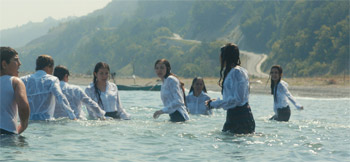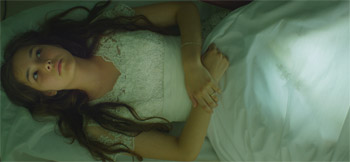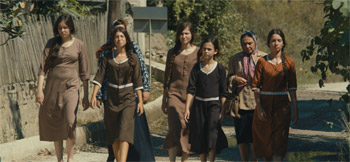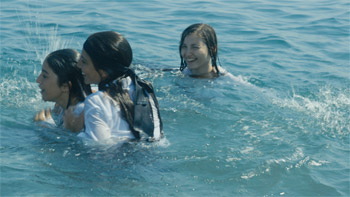Deniz Gamze Ergüven Mustang Interview

Deniz Gamze Ergüven Mustang Interview
Cast: Gunes Sensoy, Dogba Doguslu, Tugba Sunguroglu, Elit Iscan, Ilayda Akdogan, Erol Afsin
Director: Deniz Gamze Ergüven
Rated: M
Running Time: 94 minutes
Synopsis: It's the beginning of the summer.
In a village in the north of Turkey, Lale and her four sisters come home from school, innocently playing with boys.
The supposed debauchery of their games causes a scandal with unintended consequences.
The family home slowly turns into a prison, classes on housework and cooking replace school, and marriages begin to be arranged.
The five sisters, driven by the same desire for freedom, fight back against the limits imposed on them.
Nominated for a best foreign film Oscar in 2016, and anchored by sensational performances and a moving soundtrack by Warren Ellis, Mustang is a powerful portrait of female empowerment.
Mustang
Release Date: June 23rd, 2016
 Interview with Deniz Gamze Ergüven
Interview with Deniz Gamze Ergüven
Question: You were born in Ankara but have lived mostly in France. Why shoot your debut feature in Turkey?
Deniz Gamze Ergüven: Most of my family still lives in Turkey and I spent my whole life going back and forth. I feel particularly concerned by stories set in Turkey because the region is really fizzing, everything is changing. Recently, the country has swung toward a more conservative position but you can still feel the force and energy. There is a sense of being at the heart of something, that everything could go into a spin at any time, that it could go in any direction. It's also an unbelievable reservoir of fiction.
Question: Just like your graduation short, Mustang is the story of an emancipation. What were the origins of the project?
Deniz Gamze Ergüven: I wanted to talk about what it's like to be a girl and a woman in modern-day Turkey, where the condition of women is more than ever a major public issue. Clearly, the fact that I had a different perspective, because I frequently left Turkey for France, played an important role. Every time I go back, I feel a form of constriction that surprises me. Everything that has anything to do with femininity is constantly reduced to sexuality. It's as if everything a woman or even a young girl does is sexually loaded. For example, there are stories of school principals who ban boys and girls using the same stairs to get to class. They build separate staircases. It lends a huge erotic charge to the most banal things; climbing the stairs becomes a really big deal. It demonstrates the absurdity of that kind of conservatism: everything is sexual. In the end, they talk about sex the whole time. And a conception of society emerges that reduces women to baby-making machines who are only good for housework. Turkey was one of the first countries to give women the right to vote, in the 1930s, and now we have to defend basic rights, such as abortion. It's sad.
Question: Why the English-sounding title, Mustang?
Deniz Gamze Ergüven: A mustang is a wild horse that perfectly symbolizes my five spirited and untamable heroines. Visually, even, their hair is like a mane and, in the village, they're like a herd of mustangs coming through. And the story moves fast, galloping forward, and that energy is at the heart of the picture, just like the mustang that gave it its name.
Question: How much of you personally is in the movie?
Deniz Gamze Ergüven: In the opening scenes, the minor scandal that the girls provoke by climbing onto the boys' shoulders before being violently reprimanded really happened to me when I was a teen. Except that my reaction back then was absolutely not to answer back. I hung my head in shame. It was years before I was able even to protest. I wanted my characters to be heroines. And their courage had to pay off. They had to win in the end, in the most exhilarating way possible. I see the five girls as a kind of five-headed monster that loses a part of itself every time one of the girls is absent from the story, but the last-remaining piece succeeds. It's because her elder sisters were ensnared that Lale, the youngest, rejects their destiny. She is a condensed version of everything I dream of being.
Question: You seem to be saying that the only way out is education.
Deniz Gamze Ergüven: The girls' removal from school and the reaction it provokes in them is crucial to the story, but I don't adopt a militant approach. A film is not a political speech. Romain Gary used to say that he didn't go on protests because he had a whole shelf of books that marched for him. There's an element of that. The film expresses things much more sensitively and powerfully than I ever could. I see it as a fairy tale with mythological motifs, such as the Minotaur, the labyrinth, the Lernaean Hydra"the girl's five-headed body"and a ball that is signified here by the soccer match that the girls long to attend.
Question: A family with five teenage girls who arouse desires in local boys and must be protected for their own good. It brings to mind Sofia Coppola's The Virgin Suicides. What were your cinematic references in making the movie?
Deniz Gamze Ergüven: I saw The Virgin Suicides when it came out and read Jeffrey Eugenides' book, but Mustang is not a derivation of it. No more than it has its roots in Rocco and His Brothers. Among my curiouser influences, there is Salò, or the 120 Days of Sodom in terms of the way Pasolini tells the story of society grappling with fascism through the prism of a rather sordid tale. I was seeking a similar disconnect between style and substance. I often left the DVD on play while I was writing the script. I also watched a lot of escape movies, such as A Man Escaped or Escape From Alcatraz. Although the story is set in the familiar domestic framework of a family home, the dramatic register is that of a prison tale.
Before the shoot, I showed the actresses one DVD a day"Bergman's Summer with Monika, Fish Tank, Germany Year Zero, the Dardennes brothers' The Child, lots of different things"for a very precise reason every time. There were also prescriptions made to measure for each character. For example, Ilayda Akdoğan, who plays Sonay, got to see Wild at Heart by David Lynch and lots of Marilyn Monroe movies for the blurred lines between innocence and outrageous sexualization.
 Question: The choice of the remote Black Sea village of Inebolu, 600 kilometers from Istanbul, is not innocent. It participates in the sense of oppression the audience feels...
Question: The choice of the remote Black Sea village of Inebolu, 600 kilometers from Istanbul, is not innocent. It participates in the sense of oppression the audience feels... Deniz Gamze Ergüven: Yes, the location accentuates the sense of being at world's end. Principally, it was an artistic choice, for the fairytale landscapes with winding coast roads and unnerving forests. It's a hard place to get to. A few months before my first visit, there was no airport and no films had ever been shot there. I had a real sense of isolation. In the most remote villages, not only does news arrive only through official channels but also, in every house, there are sacks of coal"gifts from the Prime Minister of the time, who is now President. People have a sense of closeness, an almost family feel, to the regime, which whispers into their ears through the media. There were very few places that didn't have a TV on with the country's higher-ups speechifying. Since the shoot, an airport has opened 90 kilometers away from our location, with one flight a day. I felt like a breach had been made. A little fresh air was blowing in.
Question: You were pregnant when you made the movie. Was the shoot a real adventure?
Deniz Gamze Ergüven: It was a commando operation. I was exactly halfway through my pregnancy when we wrapped, and we were shooting twelve hours a day, six days a week. It put me in the same position of fragility as the girls, which wasn't a bad thing since it meant we were all in the same boat. Three weeks before principal photography, with everything ready, the initial producer withdrew from the project. It was like the pilot of a plane bailing out in mid-flight. The film was shafted. The crew began to fall apart. Everything I had put in place was going up in smoke. We got things back on track with another producer, but being moments away from losing everything only heightened my motivation. It was so dramatic that it simply made everybody want to transcend themselves to save the picture. Every shot had become a matter of life or death with everything depending on it. People have exceptional reactions in times of crisis. We were literally building what we were going to shoot the same day"sets, effects, stunts. It was an extremely intense adventure where everything was on the razor's edge. A kind of constant miracle.
Question: Why produce the movie in France?
Deniz Gamze Ergüven: Cinematically, my family is French. I studied at La Fémis film school, where I met people that were decisive in shaping my career. Olivier Assayas, for example, who was chairman of the jury the year I started and who, from near or afar, has always been there, looking out for me. The same goes for David Chizallet, my director of photography, who was camera operator on my capstone project, Une goutte d'eau. David has a wonderful eye and a special energy and appetite in the way he accompanies the actors. He has a catlike presence around them. He is also infused with incredible jubilation about making movies. He has three at Cannes this year and it's no less than he deserves. Alice Winocour also studied at La Fémis, but not at the same time as me. We met in 2011 at the Festival's Cinéfondation workshop. We were the only two women to be selected and we both had pretty colossal projects for a debut feature"in Alice's case Augustine, which she made in the end, and in my case Kings, which I've put to one side for the time being. I was on the point of throwing in the towel when Alice suggested that I start with a smaller project that wouldn't scare anyone. I sent her an initial treatment for Mustang and we started writing the script together. She was my rock, like a trainer for a boxer.
Question: You asked Warren Ellis, of Nick Cave and the Bad Seeds, to compose the music.
Question: Through its selection for Directors' Fortnight, Mustang will receive worldwide exposure. What reactions are you hoping for?
Deniz Gamze Ergüven: It's an honor for me to screen this film at Cannes. When I sent my script to men in Turkey, I was sometimes witness to very vivid reactions because my female take on their society was very new for them. I imagine that it will be as exotic for them as for people who live around the world. I'm looking forward to those reactions. I'd like the film to be shared, to give people pause, and to open little doors in Turkey and elsewhere.
The important thing for me is to provoke empathy for these women. For them to be allowed to speak and for their voices to be heard.
Question: Where did you find your five heroines?
Deniz Gamze Ergüven: We advertised on a massive scale and auditioned hundreds of teens over a nine-month period, in France as well as Turkey. Given the subject matter, it was important that they should come forward. There were two exceptions. Elit İşcan (Ece) was the only one with any acting experience. As a child, she had carried two features by Raha Erdem on her shoulders: Times and Winds (2008) and My Only Sunshine (2009). She was a kind of muse. I wrote the script with her in mind and was very scared that she would outgrow her character before we could shoot.
I noticed Tuğba Sunguroğlu (Selma) on an Istanbul-Paris flight while I was still writing the script. Besides her mustang vibe, I glimpsed a huge personality. She walked past me several times and I ended up stopping her and talking to her family. We did several screen tests. It was very moving because she was very young and had never acted. The first time, she was so nervous I thought she was going to have a heart attack. Then she plunged into the part.
Güneş �ensoy, Doga Doğuşlu and Ilayda Akdoğan came to our auditions. Each time, it was like love at first sight. Even at their young age, these girls have developed real acting chops. It was important to choose a whole cast and not just five separate actresses. There was a whole fabric of interconnecting relationships to bring to life. For example, some of them pair off, with one sister as the other's sidekick. It had to be really organic, with a family resemblance, interactions, connections and complementarity. I tried an array of combinations until all five of them clicked. Very soon, the girls were conspiring together and moving as a single being... One of them (not always the same one) would lead the group in a whole new direction, sometimes toward rebellion, sometimes someplace else.
Question: Did they show any reluctance to act out certain situations?
Deniz Gamze Ergüven: No. We took it step by step, detail by detail. Ece's love scene, for example, panicked the crew but not the actress. Elit was of legal age and had acting experience. Likewise, for Güneş' parents, I had drawn up a long list of what making the movie would entail for their daughter. It included things like, she'll be filmed wearing a swimming costume or bra and she'll be confronted, in her performance at least, by the death of a loved one. Some scenes in the script had coarser language than in the finished movie. And there was also a scene where the girls cut all their hair off, which was very difficult for them. Of course, we understood just how far we could go and we had to put the brakes on at times, but they would have gone anywhere I wanted to take them, I think. They had complete trust and could take it very far. There was a complete absence of inhibition.
In terms of the destiny of their characters, there was no need to push them any farther. For example, in the chewing-gum scene, when I suggested they tear off their shit-colored dresses: at first, they weren't very keen, but the costumes were so vile that it was impossible for them to keep wearing them. In the end, it became a thrilling release for them.
 Question: That's precisely the film's point of view: it's the way people look at these girls that is twisted, not the girls themselves.
Question: That's precisely the film's point of view: it's the way people look at these girls that is twisted, not the girls themselves. Deniz Gamze Ergüven: Yes. When we read the script together, we all told our own stories and all our secrets came out. I realized that we had experienced roughly the same things, but compared to me or my generation, they are much more carefree, liberated and in control of their lives. With regard to the prevailing conservatism and the situation in Turkey, their empowerment is total. They are also crazily plugged-in; they know everything about everything. It's amazing. They spend all their time filming each other, so they have a relationship to their image and their bodies that is very different from ours, and completely liberated.
There was a scene that didn't make it into the final cut, where Lale had tucked pillows under her blankets to make it look like she was sleeping when she had in fact run away. On set, she grabbed the pillows, kissing them and crying out "Oh, my love!" in a way that was totally uninhibited and refreshing. They really are light years ahead of me and their parents.
Mustang
Release Date: June 23rd, 2016
MORE





